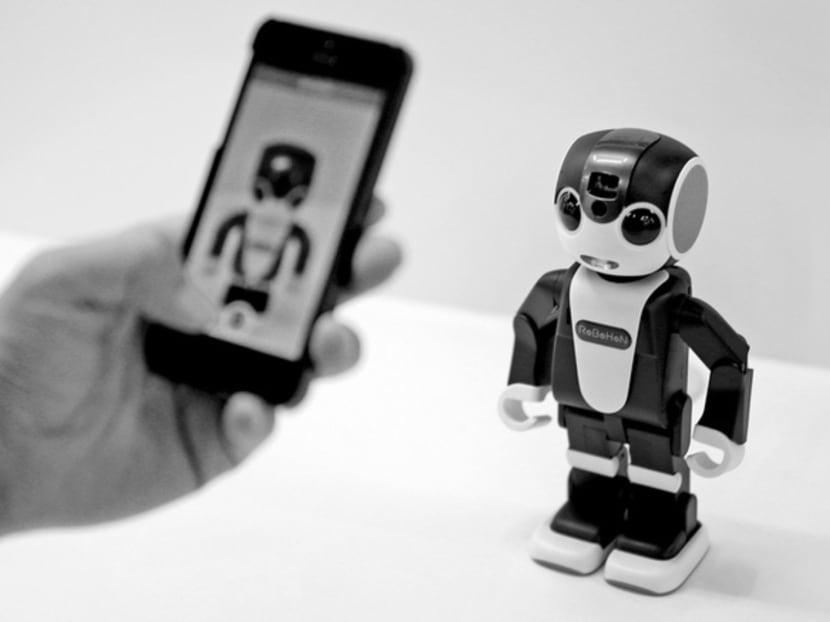Sale of Sharp, Toshiba unit not doomsday for Japan Inc
News about the potential decline of corporate Japan has been abuzz since last month’s sale of Sharp to Taiwan’s Foxconn and Toshiba’s consumer electronics division to China’s Midea Corp.

Sharp’s RoBoHon, a humanoid communication-robot-shaped mobile phone, unveiled in Tokyo last week. Overall, some of the most important advanced technologies and profitable product lines remain in Japanese hands. Photo: Reuters
News about the potential decline of corporate Japan has been abuzz since last month’s sale of Sharp to Taiwan’s Foxconn and Toshiba’s consumer electronics division to China’s Midea Corp.
The sale of 100-year-old Sharp was widely reported by the international media. In Japan, the likely loss of Japanese high-level technologies such as advanced electronics screens to foreign hands has also been under public scrutiny.
In the case of Toshiba, 80 per cent of its consumer home electronics division will be sold to Midea for about US$473 million (S$637 million) in a deal reached on March 30.
Under the agreement, Midea can use Toshiba brands for home appliances for 40 years, and also ride on Toshiba’s vast retail networks in East Asia. They are familiar with each other since Midea has been working with Toshiba for more than two decades.
By comparison, the Foxconn deal was much larger, at US$5.8 billion. Before the deals were done, commentators were already discussing their implications. Three schools of thought emerged.
One, the sales mark the end of Japanese business management exceptionalism.
In essence, Japan’s model of state-led development and identification of strategic industries, which brought success to several regional economies, is integrating normative features and has become less culturally exceptional.
Two, the eclipse of Japanese consumer electronics is attributable to the rise of China (and acute Korean competition) and economies such as Taiwan, whose subcontracting manufacturing and original equipment manufacturer (OEM) capabilities are on par with those in Japan in some fields. It is a continuation of the narrative relating to the retreating position of the world’s third-largest economy after China since 2010.
Three, the recent deals reflect the decline of Japan, given Toshiba’s accounting scandals and Sharp’s strategic weaknesses in detecting consumer electronic trends.
All three narratives may have some elements that reflect the situation on the ground, but they are reductionist. The reality is much more complex and multilayered.
For instance, Midea’s interest in Toshiba also reflects China’s complex and challenging shift from an external export-driven economy to a domestic, consumption-based one.
Chinese brands need to borrow the iconic status of established brands like Toshiba to raise their brand recognition profile among Chinese consumers. Midea can now retail Toshiba-branded products to Chinese consumers both in China and overseas (as tourists) while associating Midea’s own products with a more established brand name.
Moreover, buying established brands can immediately transfer the experience of a well-established company to an emerging one. Midea is not an exception. China’s large domestic market is prompting other players such as Gree Electric (another major Chinese consumer electronics manufacturer) to do the same thing.
Toshiba’s sale of its consumer electronics division to Midea follows on the heels of an earlier sale of its China-based manufacturing facilities to Chinese television manufacturer Skyworth.
In a bid to encourage domestic consumption as a driver of economic growth, the Chinese economy is shifting from its heavy industrial base, which is driven by state-owned enterprises (SOEs), and into light consumer electronics production so it can sell to Chinese consumers. With rising labour costs and the emphasis on environmental protection and better standards of living, China’s growth can no longer depend on making cheap products that pollute the environment. Domestic firms need more cutting-edge manufacturing technologies that generate less waste and produce higher-value tech products that are more environmentally friendly.
Legend bought NEC personal computer lines in 2011 while Chinese electronics retailer Suning purchased Japanese firm Laox.
Similarly, Foxconn’s purchase of Sharp gives the Taiwanese company access to Sharp’s screens. This strengthens Foxconn’s subcontracting supply position and negotiation power with clients that require those screens, on top of acquiring other subcontracted Foxconn products. It also allows the Taiwanese manufacturer to compete more effectively against Korean rivals such as Samsung or LG.
Overall, some of the most important advanced technologies and profitable product lines remain in Japanese hands. For example, Canon purchased Toshiba’s medical equipment division (a leading manufacturer of CT scan equipment) for ¥665.5 billion (S$8.2 billion).
The trend of an older, established electronics manufacturer selling its ageing, less competitive units to Chinese companies who acquire them to retail products through their networks is likely to continue.
This is a market-driven phenomenon that depends less on political motivations and more on economic complementarity.
It does not necessarily signal the decline of Japan Inc, as predicted by some doomsday pundits, but a process of rationalising its economy to concentrate on areas such as medical imaging, androids research, industrial robotics and other fields that it is leading competitively.
ABOUT THE AUTHOR
Lim Tai Wei is a Senior Lecturer at SIM University and Research Fellow Adjunct at the National University of Singapore’s East Asian Institute.






